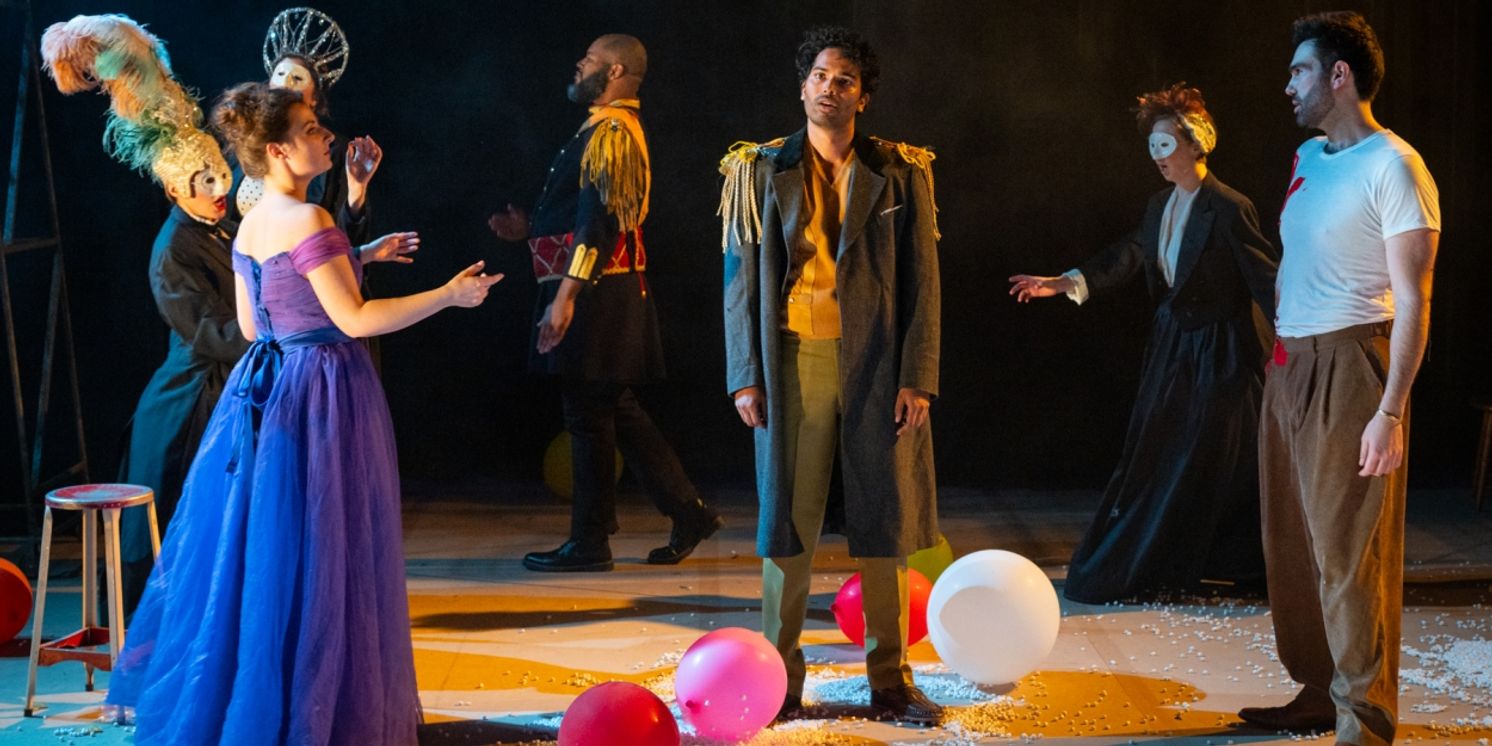Review: Heartbeat's Bio-Version EUGENE ONEGIN Dazzles under Director/Designer Dustin Wills
Music Director/Conductor Jacob Ashworth and Arranger Dan Schlosberg Make It Sing

If you cross the traditional EUGENE ONEGIN by Tchaikovsky (great even when overfilled with drama and, yes, music music music, with Konstantin Shilovsky’s co-libretto) with a touch of Ken Russell’s 1971 “The Music Lovers” (the overwrought bio-pic of Tchaikovsky with Richard Chamberlin and Glenda Jackson as his patron and wife that took the composer out of the closet for anyone who didn’t know he was there), and you might have an idea of what Heartbeat Opera’s version of the opera-cum-composer’s tale is like.
Coming together before our eyes, the pieces of the set assemble and reassemble with the help of cast and crew. This ONEGIN becomes a more intimate 100-minute tale instead of an epic four-hour grand opera, as directed by Dustin Wills in a fascinating way (even if I believe he might have brought too much of his own thinking to that he ascribes to the composer and librettist), with music newly arranged by Dan Schlosberg and conductor Jacob Ashworth. Wills was also responsible for the scenic design with Reza Behjat’s lighting. Haydee Zelideth was responsible for the spot-on costumes.
The Heartbeat Opera company specializes in transforming warhorses into foals: they may be a little wobbly on their legs, but they bring new youth to works where we might have said “I could go to my deathbed without ever seeing another [NAME OF OPERA HERE]”. There have been some changes at the top of the company fairly recently, but judging by the work done by the old and new on ONEGIN, it’s still in pretty fine shape.
Yes, there are changes in the music, including cuts. Does it ultimately matter? Sometimes. But more often than not, it makes us hear the score in a new way—the best of it after some of what might be described as “filler” (thought hardly an apt description of music by Tchaikovsky) has been chopped away and reorchestrated, taking us closer to the story and further from “tradition.” What’s left is remarkable—particularly when it’s played by a chamber ensemble as good as this one, under Ashworth, who’s also one of the violinists in the piece.
What of the performances? True, even in Heartbeat’s production, “we jump off from one of the only facts that Tchaikovsky gives us about Onegin: his friendship with Lensky,” according to the dramaturg Peregrine Teng Heard. In this version there’s a lot more than usual to the relationship between the two. Sometimes they’re just “frenemies,” as when dealing with Olga; sometimes lovers (drawing from the composer’s bio rather than the traditional opera).
As I wrote once before recently, reactions to singers are a crapshoot. Everyone brings their own perceptions and prejudices to a performance; what appeals to one doesn’t necessarily charm another. While the title of the opera is EUGENE ONEGIN (or the Cyrillic equivalent), he doesn’t necessarily become the center of the opera when you’re listening to it. At Heartbeat, Onegin doesn’t walk away with the most attention, despite the best efforts of baritone Edwin Joseph.
I’ve seen productions where Lensky has threatened to steal the show away from Tatyana and Onegin (if only he hadn’t been so inconveniently, and offhandedly, killed by Onegin in a duel in Act 2). But this doesn’t necessarily give the opera here to Lensky, notwithstanding the performance by tenor Roy Hage, who has some of Tchaikovsky’s most gorgeous music and one of his best arias, “Kuda, kuda, kuda vi udalilis,” which he sings just before his death.
For me, the female roles dominated, because of the strength of the singers, especially the Tatyana of Emily Margevich. She made the transition from the girlish character of the first act—with a heartfelt, beautifully sung “Letter Scene” where she almost seems suffering from ADHD in expressing her love for Onegin (who, unfortunately from my viewpoint, is hovering above her in this staging). When she returns in the third act, now Princess Gremina, and turns down Onegin’s advances when he has second thoughts about having rejected her as a young girl, she’s fully in command and there isn’t a false note.
I liked all the life and voice that mezzo Sishel Clerie brought to Olga, whether with her sister or as the pawn in the Lensky-Onegin falling out. And I appreciated the vocal contributions of mezzo Shannon Delijani as Larina (mother of Olga and Tatyana), bass-baritone Lloyd Rechard Jr. as Gremin (who did well, despite his odd staging, a la Olympia in HOFFMANN), and mezzo Tynan David as nurse Filipyeva.
Conductor/violinist Ashworth was a strong presence in the evening, heading the band in a vital performance of the Tchaikovsky music. A particular shout-out to the work of Nan-Cheng Chen on the cello and Nicolee Kuester on the horn.
Caption: (l to r, front) Emily Margevich, Edwin Joseph (ctr), Roy Hage. Rear: Lloyd Reshard Jr., Tynan Davis,
Credit: Russ Rowland/Heartbeat Opera
EUGENE ONEGIN and a new opera, THE EXTINCTIONIST, are being performed in repertoire at the Baruch Performing Arts Center, Lexington Avenue and 25th Street in NY, as part of Heartbeat’s Spring Festival. ONEGIN will be performed on April 9, 11 and 13 (currently sold out). For more information and tickets, see the company’s website.
Reader Reviews
Videos

